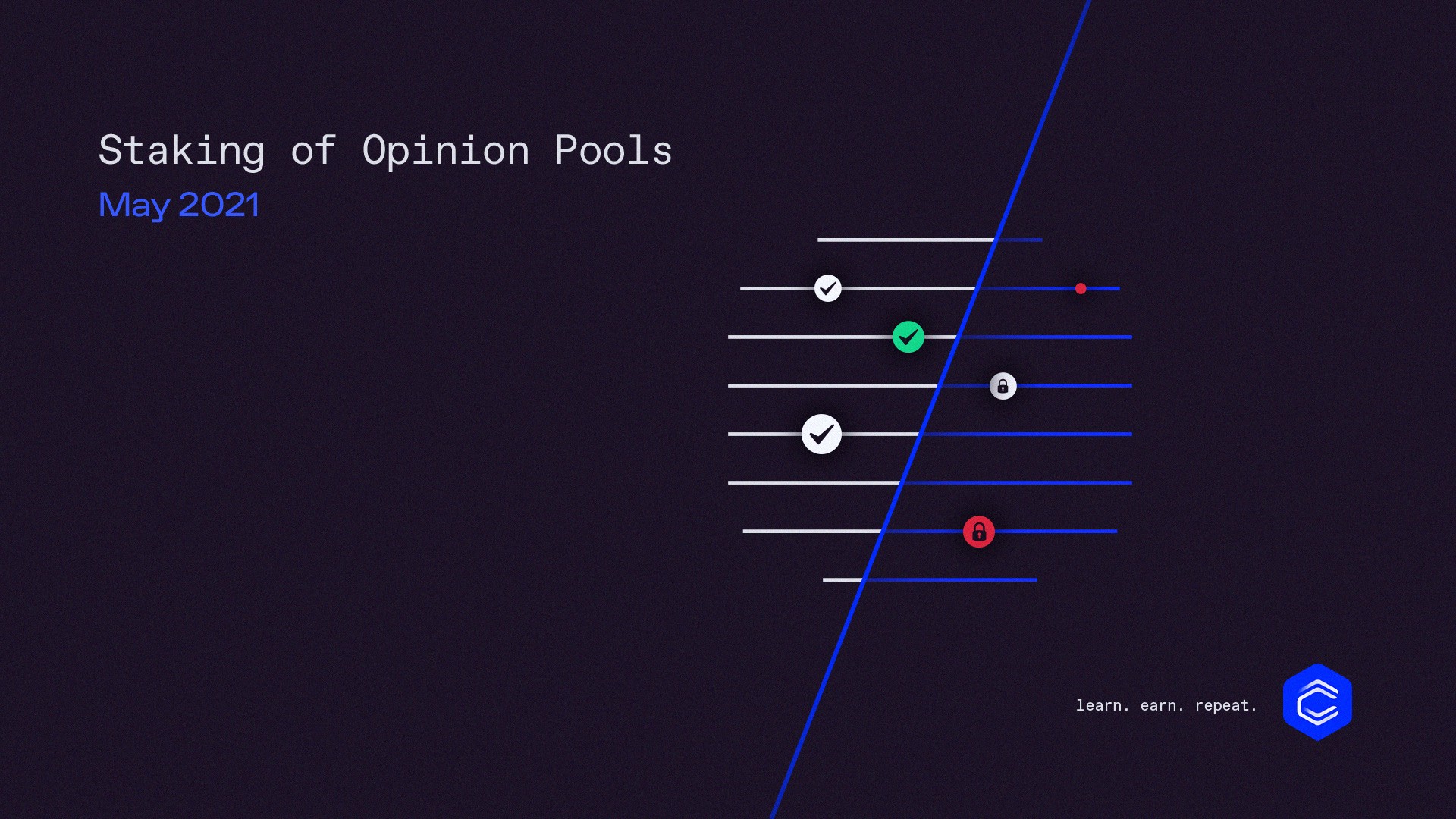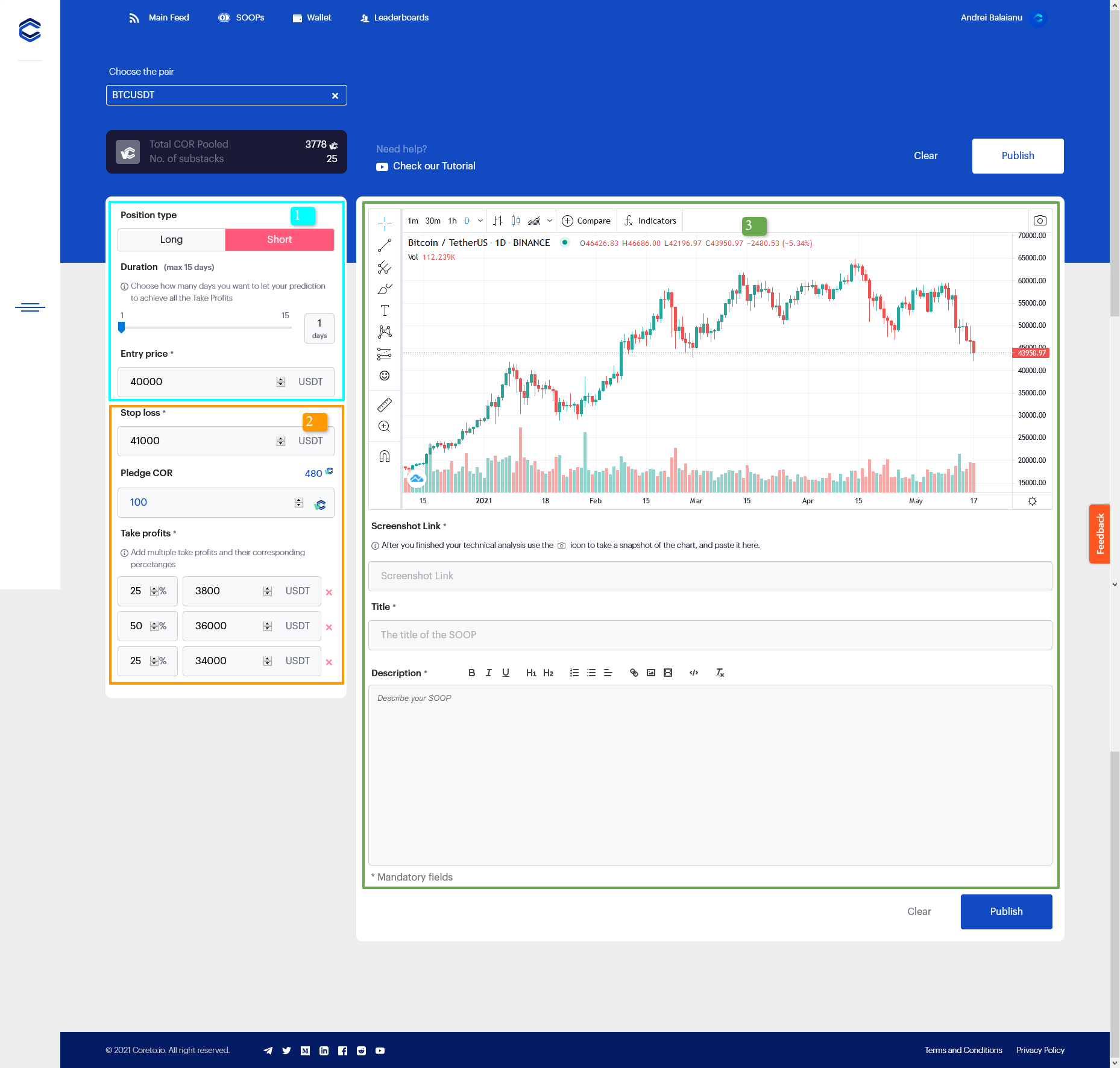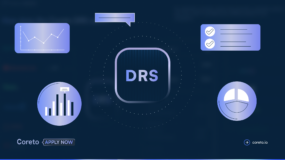- Home
- Platform Features
- Staking of Opinion Pools (SOOP ...

Staking of Opinion Pools is a tool for traders to make price predictions for crypto projects, build up their reputation, as well as earn $COR. Right now, any so-called predictions or signals on traditional mediums (like Telegram or Twitter) can be — and sometimes are — deleted if the results are not what their creators were expecting.
The lack of accountability for making a bad call (or even removing it) and acting as nothing happened, is part of what makes the current crypto space feel like a rough and dangerous place to be in. Social media “revolts” are short-lived and soon forgotten, and people can — and sometimes are — just blindly following influencer calls on nothing but faith.
The Staking of Opinion Pools feature aims to change this by making every call count towards the creator’s reputation, bringing accountability and rewards for making educated trading calls.
Every member of Coreto has a profile with two main indicators: Trust and Performance.
Everyone starts at “zero”, no matter how famous they are or how many followers they have, and Trust and Performance will need to be earned by everyone by interacting with the platform.
The core concepts of Staking of opinion pools – SOOPs
Let’s have a look at some of the core concepts that we need to understand about the Staking of Opinion Pools, what they mean, and how to use them.
There are four main concepts that need to be explained before going into how SOOPs affect the Trust and Performance of users:
- Stack = a Stack is a prediction pool that is defined by: a trading pair (ex: BTC/USDT), an entry price, and a time frame (duration).
- Opinion = an Opinion is a price prediction that is contained inside a stack and is defined by: a trading direction (long or short), a Stop Loss price, one or multiple Take Profit prices, and can have a Trading Analysis attached. Creators will also have to add a title and, more importantly, a description explaining why they believe in their Opinion, and it can also be backed with $COR by the creator in order to add weight to the prediction.
- Pledge = a Pledge is a $COR backing of an Opinion, either by the creator, as part of the Opinion, or by someone other than the creator as a backer.
- Challenge = a Challenge is a competing Opinion on the same Stack, made by someone other than the original Opinion’s creator. It will have the same Entry Price and Duration, but a different Trading Analysis, Stop Loss and Take Profits.
Putting all of these together, we can now have a better understanding of the different moving parts that make up the Staking of Opinion Pools feature, and have a look at how it can be used in practice on our ALPHA platform.
How to create an Opinion
If you have a good idea about how the price of a trading pair will move over the next period of time, you can put your knowledge to use by creating a new Opinion using the Staking of Opinion Pools feature of the Coreto platform.
The process is as easy as completing all the necessary parameters of your call in the relevant fields. But let’s dive a little more into it and see it in practice.
Let’s say that we are sure that the BTC/USDT price will go down in the next few days, and we want to make a “short” call for it. How would we go about it?
First, we find the “Make Analysis” button and go to the creation page. We then choose the BTC/USDT pair and start adding the necessary information.

There are three main areas of interest on the creation page:
- The Stack parameters: position type (long/short), the duration of the trade, and the entry price;
- The Opinion parameters (the call): Stop Loss, $COR Pledge (optional) and Take Profit(s);
- The Opinion information: Trading Analysis chart, title, and description explaining the call.
As can be seen in the image, we can use the TradingView chart available on the page in order to make our analysis, or we can add an externally created chart analysis by adding the corresponding URL as the Screenshot Link.
Once entering all the information in the respective fields, we can hit the Publish button and have our Opinion released into the wild!
So, what happens next? Once publishing an opinion, it will be seen by other users of the Coreto platform and they can interact with it.
They can
- Pledge $COR to it
- challenge it
- agree or disagree with it using the like/dislike buttons, and
- add it to their watchlists in order to stay up to date with how it turns out.
An important thing to remember is that once the Entry Price is reached, Pledges and Challenges CAN NO LONGER BE MADE on that Opinion!
This is done in order to have a leveled playing field and give every backer or challenger a fair chance to get in on the action.
Pledging and Challenging
When creating a new SOOP, creators can decide to pledge some $COR to that Opinion. But why would you want to pledge your $COR when creating an Opinion?
The first reason is that by pledging $COR you will get a boost for the TRUST and PERFORMANCE that you gain based on how your prediction goes.
Also, if you decide that you don’t want to pledge $COR when creating an Opinion, pledging and challenging that Opinion will not be possible for other users. Basically, by not pledging $COR as an Opinion creator, you lock that Opinion’s Stack off for other users and it can only ever affect your own reputation. There will not be a $COR pool for that stack.
But let’s say you created your Opinion and you also pledged some $COR. How would others be able to interact with it?
Once published, your Opinion will be added to the Main Feed of the platform, as well as your public profile’s feed, so other users will be able to find it, analyze it, and decide if they want to support it, contest it or just watch and see how it goes.
Until the Opinion’s Entry Price is reached, users can participate in that Stack’s $COR Pool by Pledging or Challenging your Opinion.
To support an Opinion, use the Pledge button, decide how much $COR you want to put into the Pool, and that is it! You now have a share in both the rewards and risks of that Opinion’s evolution.
But, say someone doesn’t agree with your prediction. Until your Opinion’s Entry Price is reached, other users can Challenge that Opinion and enter into a trading competition with you over the evolution of that trading pair’s price action.
By clicking the Challenge button on your Opinion’s page, users will be taken to a new page, similar to that of the Opinion creation page, with the difference that the first group of fields (the Stack data) will already be filled and cannot be changed, as challenging Opinions can only be created on an existing Stack.
Challengers must have a different Stop Loss and Take Profits and will also need to support their prediction by adding a TA chart, a title, and a description of the new Opinion.
They will also need to pledge $COR to their own Opinion in order to participate in the $COR Pool and have the opportunity to also win $COR alongside the TRUST and PERFORMANCE they will get based on how it ends up.
How are SOOPs evaluated?
Every Opinion in a SOOP is evaluated at the end of the defined time frame, relative to the moment when the Entry Price is reached. The system will calculate each Opinion’s ROI (return on investment) and decide the relative performance of each Opinion in the SOOP.
This will decide how each Opinion in a “challenge scenario” fairs against the others.
This is the determining factor of how the $COR pooled for a SOOP will then be re-distributed to each participant, based on how much $COR each participant has contributed to the pool.
There are multiple outcomes possible, so let’s examine the different possibilities.
Outcomes explained
As previously mentioned, depending on whether you participate by creating an Opinion, by Challenging other Opinions, or just Pledging $COR to existing Opinions, you have different benefits (and some risks, too) that you should be aware of.
Also, depending on the different scenarios that can be at play, different possible outcomes are available.
Let’s dive in and analyze the different possible scenarios and what doors they open up.
Creating an Opinion without pledging $COR as the creator
This scenario is the most basic form of SOOP. If the creator doesn’t pledge any $COR to the new Opinion, that opinion’s Stack is locked for everyone else. This means that it cannot have a $COR Pool and no other users can Pledge or Challenge it.
In this scenario, only the creator’s TRUST and PERFORMANCE score is affected by the result of the prediction (ROI).
Not having $COR in play means that there are no real risks involved, other than the creator’s TRUST and PERFORMANCE being affected by the result. You can use this approach if you are just looking to build up your reputation, but are not yet confident enough to also put your $COR in the game.
Creating an Opinion, pledging $COR, having no Challenges
When creating an Opinion and also pledging $COR, until the Entry Price is reached, others can pledge $COR to that Opinion, or Challenge it.
In this scenario, when there are no Challenges to an Opinion, both the creator and other users that have pledged $COR to that Opinion will get all of their $COR tokens back at the end of the SOOP.
The creator will also have the TRUST and PERFORMANCE adjusted, based on the results of the prediction.
By pledging $COR, the creator is also “putting their money where their mouth is”, showing confidence in their ability and analysis, so they will also have a TRUST and PERFORMANCE boost at the end of the SOOP, based on how much $COR they have in play.
This is a great way to get an edge over the competition if you have confidence in your skills, even if you get no challengers.
Creating an Opinion, pledging $COR, and having Challenges
In this scenario, all the Opinions made on the same Stack will participate in the same Staking of Opinion Pool, with all the pledges being made on all participating Opinions (by both creators and backers) being added to the same $COR pool.
At the end of the SOOP, the system will evaluate all the Opinions based on their ROI. Based on each Opinion’s performance relative to the actual market evolution, each Opinion will have a certain amount of $COR available for rewards.
The ones with the best performance will have more $COR available than the initial amount, raised from the pledges of the creator and backers. In consequence, the ones with poor performance will have less $COR available for rewards, as some of the initial amounts will be redistributed to the Opinions with better ROI.
It’s important to remember that this is NOT a “winner takes all” scenario. The relative outcome of each Opinion will decide how much $COR is redistributed. If one Opinion’s ROI is far greater than the others, the redistributed amount will be bigger than if the competing Opinions are closer in their results.
After the $COR prizes are distributed between the Opinions, each participant (creator and backer alike) will be awarded $COR from the prize pool, based on how much $COR they contributed.
This ensures a fair system, based on merit and contribution.
Conclusions
The Staking of Opinion Pools allows every user of the Coreto platform to test their knowledge and trading skills and learn from the experience of others.
Even if you are just getting started, and only want to learn by doing, you have the option to contribute, grow and experiment by creating SOOPs without pledging $COR.
If you are a knowledgeable trader, you can build your reputation, show your skills, and earn $COR in the process.
All users can participate as backers, sharing the risks and rewards with the SOOP creators or challengers.
Having this system in place, having a tracked record of PERFORMANCE and TRUST, helps us reward the correct players that bring the most value to the community.
The Staking of Opinion Pools feature is only the first of many that will be added to our Coreto platform. Content creators, reviewers, fact-checkers, projects, and project teams, will all have specialized features to use and help them build their own reputation and monetize their knowledge and work.
Reserve your spot for the ALPHA (if you have not yet done so), use the platform, give us your feedback and help us get there much faster!




